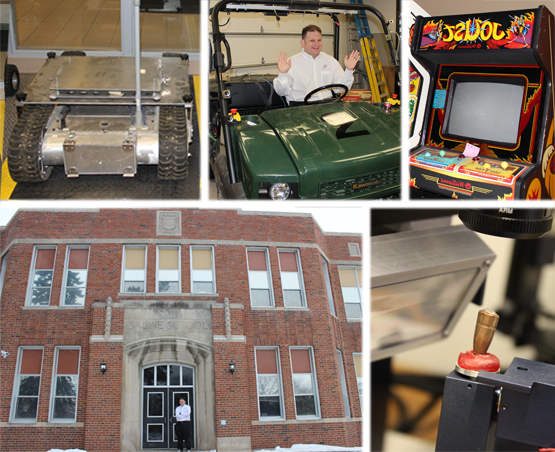Hailing the future of autonomous taxis
Ford acquires Quantum Signal AI, founded by ECE alum Mitchell Rohde, to make robotaxis and driverless delivery vehicles a reality within two years.

 Enlarge
Enlarge
Ford is getting into the pizza business – or, at least, the pizza delivery business.
Within two years, Ford plans to have driverless cars on the road that can deliver everything from late night snacks to people. To help accomplish this goal, they acquired Quantum Signal AI (QS AI), a U-M startup founded by Mitchell Rohde (BSE EE ’94; MS EE:S ’96; MS PhD BME ’97 ’00) and Professor Emeritus Bill Williams in 2000.
QS AI develops smart systems leveraging signal/image processing and control algorithms. The company has built products and solutions for customers worldwide for twenty years, with the last 15 focusing heavily on mobile robotics, autonomy, and related areas. QS AI has largely operated as a defense contractor, working with the U.S. military on robotic systems (such as remote-controlled sentinel security robots) and simulation tools (their ANVEL simulation package is heavily used throughout the Army), but Rohde says the opportunity to work with Ford on this project was too good to pass up.
“Being a part of the transition to the age of increased mobility and autonomy is a once in a lifetime opportunity,” Rohde says. “The confluence of advancements in sensors, communications, algorithms, actuators, and robotics in general are going to enable all sorts of transportation opportunities and services that were never possible before. It’s very exciting to be a part of building that future.”
Rohde says that while nuances between military and civilian application are different, the underlying principles of perception and control are the same. What’s more, both military and civilian applications involve fast-paced, chaotic environments, giving his team the needed expertise to address current issues with mobile robotics.
“Every single program, project, and capability that we’ve done recently is a direct fit with the kind of things that are being pursued on the commercial side or for passenger cars and personal vehicles,” Rohde says.
Driverless cars offer convenience – imagine being able to take a nap while you commute to work! – but they are more important for safety and accessibility. Nearly 1.35 million people die in road crashes each year, and an additional 20-50 million are injured or disabled. Autonomous vehicles have the potential to react much quicker and more efficiently than people, and do not suffer from distraction or sleepiness.
In addition, there are many members of the population who can’t or don’t drive. For the elderly or disabled, robotaxis would offer independence and mobility at a fraction of the cost of current people-operated services, such as Uber or Lyft.
Many of QS AI colleagues from Ford will be working in the new Michigan Ford Robotics building on North Campus slated to open in 2020. Rohde hopes this will lead to even more opportunities to collaborate with U-M.
“We’ve been working with U-M basically since we started back in 1999,” Rohde says. “It’s always an exciting thing, and we’re always looking for great collaborations with faculty and for enthusiastic graduates to come and join the team.”
More Info
Rohde is a member of the ECE Advisory Council
The Mad Scientist’s Lab: A look inside Mitch Rohde and Quantum Signal’s school-sized playhouse
 MENU
MENU 
